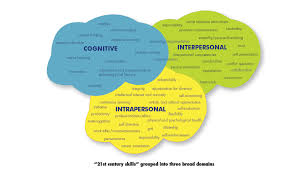
Here are five things that we need to remember about our current fascination with 21st Century Skills:
1. Most of them date from the 19th Century. When we set aside technology (which changes daily), what are the skills that we are advocating for? Literacy (print and digital); numeracy; effective oral and written communications; collaboration and teamwork; creative problem-solving; social thinking; ethical values and behaviour etc. are all attributes that my grandfather would have been quite skilled at a century ago.
2. Learners don't have to adjust to change, teachers do. Our students live in the "now", educators are constantly playing catch-up. No-one would take their child to a doctor who hadn't updated her skills and kept up with current research since leaving medical school ten years ago; but how often do we send our child to a teacher who hasn't kept up to date? For most of our students, 21st century skills is a meaningless term given the fact that they have lived their whole lives in the 21st century. This is the "new" normal.
3. Schools (and universities) are the last bastion of the "knowledge is power" philosophy. In an information-rich age, access is power and the ability to find, sort and analyze information is a far more adaptable and useful sphere of knowledge than being able to recite the lineage of the British monarchy back to the Norman Conquest. In too many classrooms, the use of the power of technology is an updated version of the filmstrip projector/cassette player era of my teaching career. It is just an updated tool to teach "content".
4. Schools spend way too much time in the Cognitive Sphere. Almost five years ago, the National Research Council identified a host of interpersonal (conflict resolution, leadership, collaboration, empathy, etc.) and intrapersonal skills (perseverance, adaptability, integrity, initiative, etc.) that have "measurable benefits for multiple areas of life and therefore are critical for all students". These "soft" skills are developed intuitively by the best teachers but not as systematically as they should be.
5. People a century from now will laugh at you. So get over yourself!
There is a growing body of research that tries to put all of this together. The Ontario Ministry of Education recently released a discussion paper on 21st century competencies.
http://www.edugains.ca/resources21CL/About21stCentury/21CL_21stCenturyCompetencies.pdf
They take the concept of competencies beyond that of the simple mastery of "skills":
A skill is seen as the ability to perform tasks and solve problems, while a competency is seen as the ability to apply learning outcomes adequately in a defined context (education, work, personal or professional development). A competency is not limited to cognitive elements (involving the use of theory, concepts, or tacit knowledge; it also encompasses functional aspects (involving technical skills) as well as interpersonal attributes (social or organizational skills) and ethical values.
My grandfather would have felt right at home!


 RSS Feed
RSS Feed
